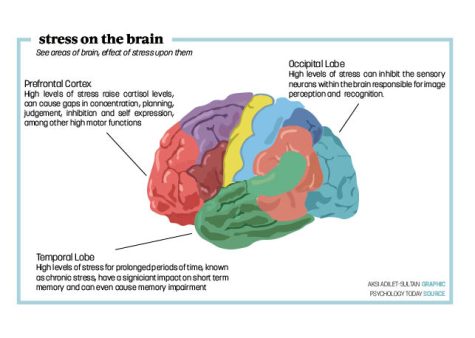Homework is not a new concept in our everyday lives. Many classes provide homework so students can practice skills and study for exams. However, homework can sometimes have a detrimental effect on students and their mental health. It raises the question of whether or not homework is even beneficial to students in the long run. With Brain Awareness week from March 13 to 19, students such as senior Sarah Dawood said she has concerns about homework and the effects it has on her emotional and social well-being.
Dawood said homework has often caused her to feel overwhelmed, especially when she was assigned homework after returning to school from hospitalization.
“I was sick for almost two weeks…I’m five weeks behind on my schoolwork. Right now for me, everything has been very overwhelming,” Dawood said. “(Before) I got sick, I’ve never been failing classes like this where it’s just a struggle to even try to get it up because (my grade) is already so low.”
English teacher Allison Malloy said she personally does not believe in the benefits of homework and said she does not assign any to her students.
“Fundamentally, I do not think homework is something that students have to do. Personally, if I am doing my job as a teacher in the classroom, I am making them think and I am keeping my classroom rigorous,” Malloy said. “It’s a hard class when they’re in the classroom, but I do not believe that it is something that we need to take home.”

Malloy said she has seen students neglecting their mental and emotional well-being in order to get their homework finished. She said she is worried about the impact homework can have on students’ health.
“I think that a lot of students are sacrificing sleep, which is then sacrificing their own emotional well-being and their ability to balance all the things,” Malloy said. “Past midnight is when I get a lot of emails from students where they’re saying they go to bed at two or three (a.m.) and that’s not a healthy schedule.”
Dawood said homework makes her feel burnt out, which affects many aspects of her life and often makes her push her friends away.
“When I get (burnt) out, it affects everything. I don’t want to go out with my friends even if I can. I deserve the day off, why would I put in the effort into interacting with people and put my own negativity onto them?” Dawood said. “I’m never in a good mood.”
Malloy said she agrees with Dawood, that teachers give students too high of an expectation when it comes to school work.
Malloy said, “Teachers in this building would say ‘I don’t check my emails at home, that time is for my family and for my life,’ yet we ask students to use that same amount of time here and go home and spend hours per class on homework.”
However, Junior Logan Obrique said homework is beneficial for him.
“I would say that the homework I get is helpful,” Obrique said via email. “I am currently a student in French III and I know that many of my classmates think that having 30 to 45 minutes of homework every class is annoying, but I personally think it’s helpful.”
Obrique said homework gives students like him an opportunity to understand and review material and also improve academically. He said success is a driving factor for him to push through a course when it gets difficult.
“Good grades (were) a thing that motivated me to keep pushing forward,” Obrique said, “like knowing that I was excelling in a class that a lot of people couldn’t. That’s also why I kept taking AP history classes in spite of the mental toll it took on me.”
To maintain this motivational purpose behind homework and reduce burnout, Malloy said she advises students to know their limits and prioritize their assignments.
“We do not have to take every single AP class that this school offers. I think we are going to be okay and we are going to get into great colleges even if we don’t,” Malloy said. “Another thing is that we have to prioritize. If it’s a little assignment and it’s sleep or the assignment, sometimes we have to pick sleep.”
Dawood agreed with Malloy and said teachers should also be aware of their students’ personal lives when assigning homework.
“There’s just a lot of stuff going on in the average student’s life,” Dawood said. “Just be a little aware of what we are doing. Like we are applying for scholarships and looking at colleges, just be aware.”
Dawood said instead of homework, teachers should provide a comfortable environment for students in order to encourage them to ask questions and increase participation in class.
“I understand that some teachers need to give homework like in math,” Dawood said. “(But) providing a culture of opening up and letting your students know that you’re okay with questions is more beneficial than homework.”

































![AI in films like "The Brutalist" is convenient, but shouldn’t take priority [opinion]](https://hilite.org/wp-content/uploads/2025/02/catherine-cover-1200x471.jpg)










































![Review: “The Immortal Soul Salvage Yard:” A criminally underrated poetry collection [MUSE]](https://hilite.org/wp-content/uploads/2025/03/71cju6TvqmL._AC_UF10001000_QL80_.jpg)
![Review: "Dog Man" is Unapologetically Chaotic [MUSE]](https://hilite.org/wp-content/uploads/2025/03/dogman-1200x700.jpg)
![Review: "Ne Zha 2": The WeChat family reunion I didn’t know I needed [MUSE]](https://hilite.org/wp-content/uploads/2025/03/unnamed-4.png)
![Review in Print: Maripaz Villar brings a delightfully unique style to the world of WEBTOON [MUSE]](https://hilite.org/wp-content/uploads/2023/12/maripazcover-1200x960.jpg)
![Review: “The Sword of Kaigen” is a masterpiece [MUSE]](https://hilite.org/wp-content/uploads/2023/11/Screenshot-2023-11-26-201051.png)
![Review: Gateron Oil Kings, great linear switches, okay price [MUSE]](https://hilite.org/wp-content/uploads/2023/11/Screenshot-2023-11-26-200553.png)
![Review: “A Haunting in Venice” is a significant improvement from other Agatha Christie adaptations [MUSE]](https://hilite.org/wp-content/uploads/2023/11/e7ee2938a6d422669771bce6d8088521.jpg)
![Review: A Thanksgiving story from elementary school, still just as interesting [MUSE]](https://hilite.org/wp-content/uploads/2023/11/Screenshot-2023-11-26-195514-987x1200.png)
![Review: "When I Fly Towards You", cute, uplifting youth drama [MUSE]](https://hilite.org/wp-content/uploads/2023/09/When-I-Fly-Towards-You-Chinese-drama.png)
![Postcards from Muse: Hawaii Travel Diary [MUSE]](https://hilite.org/wp-content/uploads/2023/09/My-project-1-1200x1200.jpg)
![Review: "Ladybug & Cat Noir: The Movie," departure from original show [MUSE]](https://hilite.org/wp-content/uploads/2023/09/Ladybug__Cat_Noir_-_The_Movie_poster.jpg)
![Review in Print: "Hidden Love" is the cute, uplifting drama everyone needs [MUSE]](https://hilite.org/wp-content/uploads/2023/09/hiddenlovecover-e1693597208225-1030x1200.png)
![Review in Print: "Heartstopper" is the heartwarming queer romance we all need [MUSE]](https://hilite.org/wp-content/uploads/2023/08/museheartstoppercover-1200x654.png)



